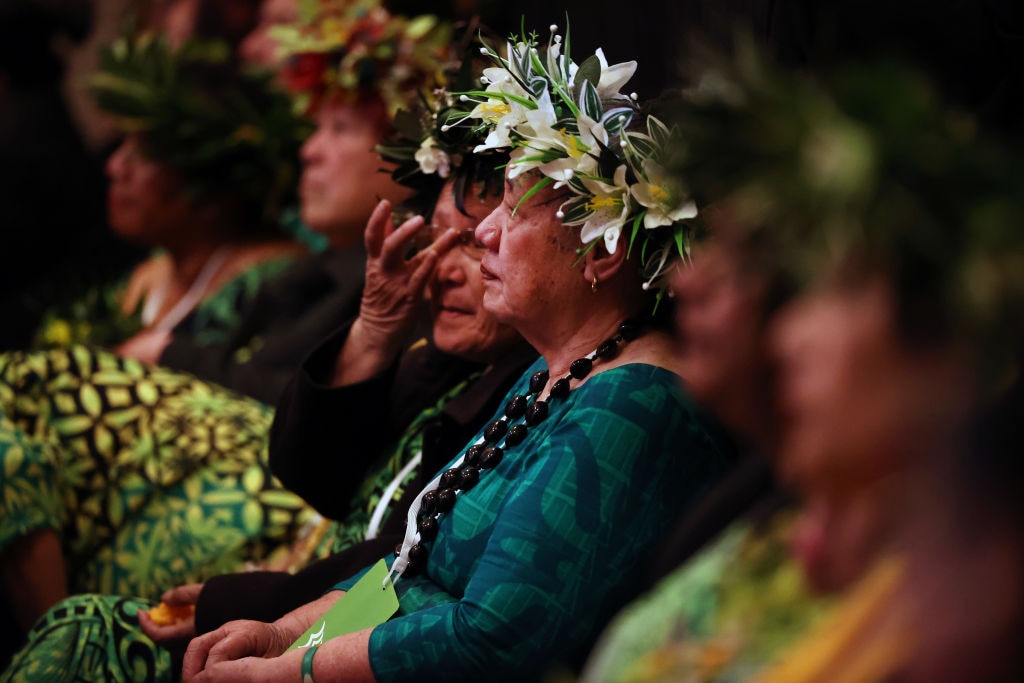Reuters
August 01, 2021

MELBOURNE (Reuters) - New Zealand's Prime Minister Jacinda Ardern issued a sombre state apology on Sunday to the Pacific community for racially targeted immigration raids in the 1970s that resulted in deportations and prosecutions.
The "Dawn Raids", which often occurred early in the morning, took place from 1974 to 1976 when New Zealand's economy was in a downturn and the government clamped down on immigrant workers from the Pacific who overstayed their work visas.
Addressing hundreds of people in attendance for the formal apology, Ardern said members of the Pacific communities continue to "suffer and carry the scars" of the raids in which they were specifically targeted and racially profiled.
"Today, I stand on behalf of the New Zealand government to offer a formal and unreserved apology to Pacific communities for the discriminatory implementation of the immigration laws of the 1970s that led to the events of the Dawn Raids," Ardern said.
"The government expresses its sorrow, remorse, and regret that the Dawn Raids and random police checks occurred and that these actions were ever considered appropriate."
As part of its formal apology, Ardern said her government will provide NZ$2.1 million ($1.5 million) in academic and vocational scholarships for Pacific communities and $1 million in leadership scholarships for young people from Samoa, Tonga, Fiji and Tuvalu, among others.
Sunday's event included an Ifoga, a traditional Samoan ceremony in which people ask for forgiveness or receive forgiveness, where some ministers and members of parliament draped a mat over Ardern, which was then removed by members of the Pacific community.
"There were no reported raids on any homes of people who were not Pacific; no raids or random stops were exacted towards European people," Ardern said during her apology.
($1 = 1.4339 New Zealand dollars)
(Additional reporting by Stefica Nicol Bikes in Sydney; Editing by Edmund Klamann)

New Zealand Prime Minister Jacinda Ardern speaks at Auckland Town Hall event
Governments from both sides of the political spectrum oversaw the raids, when Pasifika people were racially profiled as authorities chased visa overstayers.
New Zealand has moved to make good on sins of the past, with Prime Minister Jacinda Ardern issuing a formal state apology for historic "racist" policing of Pacific people.
On Sunday, hundreds packed Auckland Town Hall to hear a fulsome apology for the "dawn raids" of the 1970s.
Governments of both political stripes oversaw the raids, when people of colour were racially profiled as authorities chased visa overstayers.
Studies have since shown Pacific peoples were no more likely to overstay their visas than migrants from the US and UK, but much more likely to be prosecuted.

Guests listen as Jacinda Ardern makes the apology
Getty Images AsiaPac
The state-backed discrimination and subsequent deportations separated families and devastated communities.
"It was so painful," said Pacific Peoples Minister Aupito William Sio, who lived through the raids.
"Some nights it was 3, 4am ... there was a banging noise at the front door and in (the police would) come.
"I remember walking down our street and some of the other older kids, they'd taunt us. They'd say 'go home, coconut'. That was the atmosphere.
"Even today my father can't talk about it ... so many have felt so much shame."
The apology featured many traditional elements of the Pacific and Aotearoa.
After a powhiri - with speeches, song and the Maori 'hongi' greeting between community and government leaders - Ms Ardern addressed the full house in four languages: te reo Maori, Tongan, Samoan and English.

Guests at Auckland Town Hall on Sunday
Getty Images AsiaPac
"I stand before you as a representative of those who did you harm," she said in Samoan.
"While no amount of rain can remove the bitter salt from the ocean waters, I ask you to let our spiritual connectedness soften your pain, and allow forgiveness to flow on this day."
As many in the crowd wept, Ms Ardern said she felt the flow-on effects from the dawn raids in the present day.
"It remains vividly etched in the memory of those who were directly impacted. It lives on in the disruption of trust and faith in authorities, and it lives on in the unresolved grievances of Pacific communities.
"Today, I stand on behalf of the New Zealand Government to offer a formal and unreserved apology to Pacific communities for the discriminatory implementation of the immigration laws of the 1970s that led to the dawn raids."

What Australia can learn from New Zealand about signing a treaty with its Indigenous peoples
Ms Ardern said she wanted to "pave a new dawn" for Pacific communities, announcing $2.9 million AUD in scholarships to Pacific students both in New Zealand and the region.
The government will also incorporate the dawn raids into the history curriculum, and support Pacific artists and historians to create an official record of the mistreatment.
Sunday's formal apology follows two others issued by New Zealand, both by former leader Helen Clark.
The first was to Chinese immigrants who for many years were asked to pay a specific tax, and the second was to Samoa for mistreatment during New Zealand's colonial administration.
SOURCE AAP - SBS


















